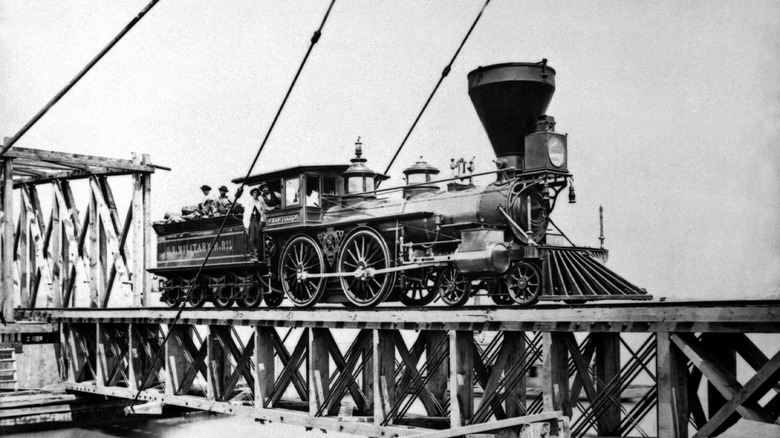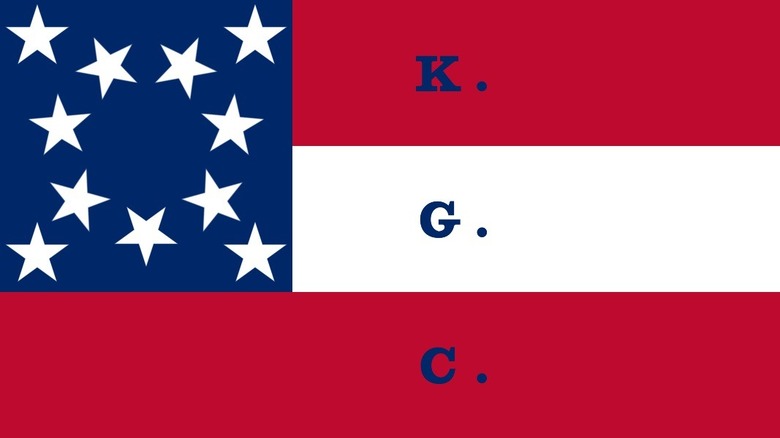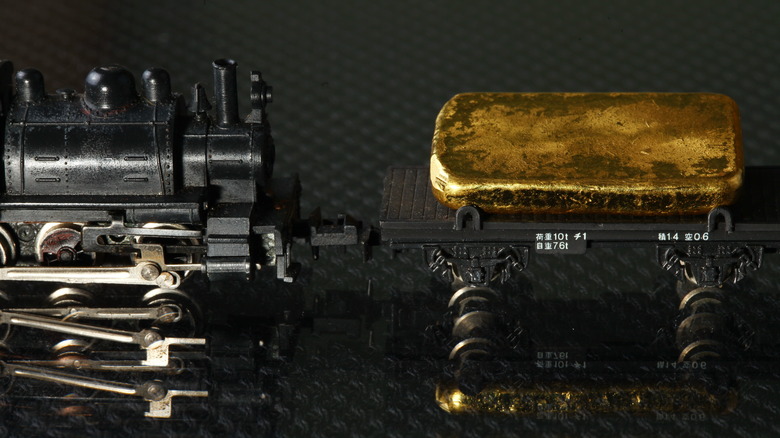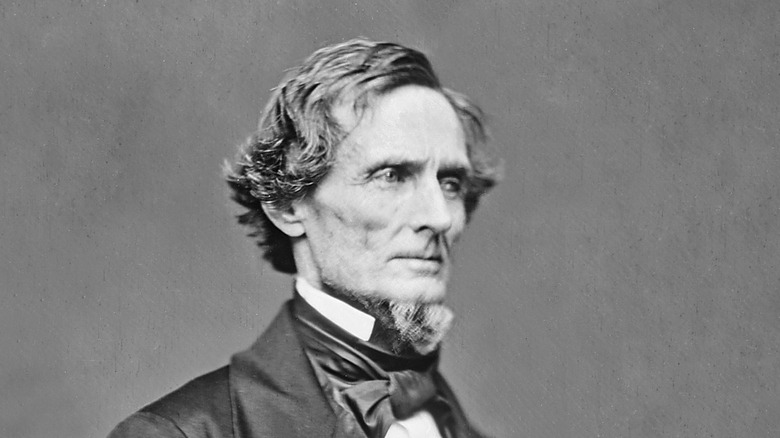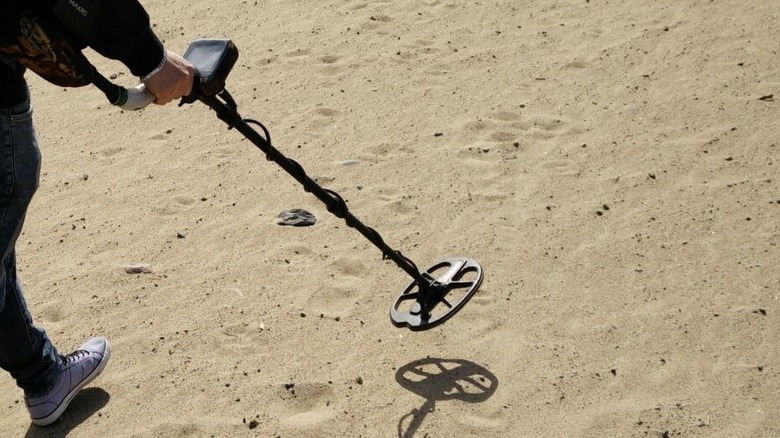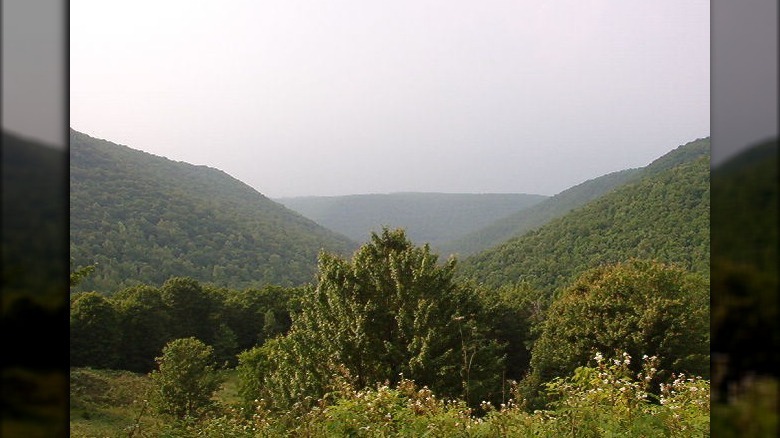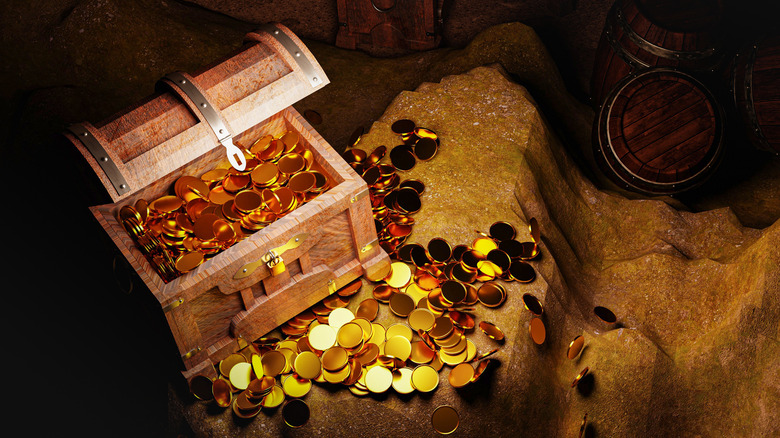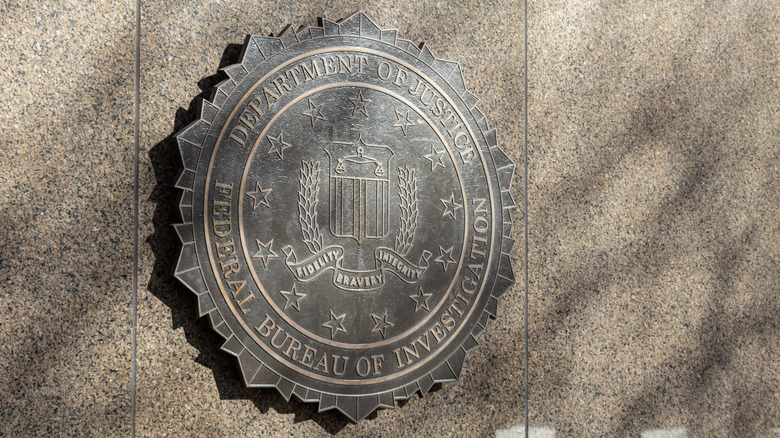The Crazy Story Of Why The FBI Went Searching For Lost Treasure
It started on a dark summer night in the woods of rural western Pennsylvania. A train rumbles through the trees, seemingly empty except for a couple of cars and a contingent of Union Army soldiers. Are they so alert because it's the height of the Civil War? Or could they be harboring a deeper secret? After all, why bother with all that secrecy and an armed military escort if there wasn't something interesting on board?
As the story goes, something went wrong between this lonely spot known as Dents Run and the train's destination of the U.S. Mint. Some versions of the story go so far as to say that the train was found empty, apart from the remains of a few of the Union soldiers. As for the cargo, it was rumored to be a massive haul of gold taken from Confederate hands, its worth totaling more than $50 million dollars in today's money, per CNN.
No wonder, then, that the legend of the Dents Run gold has persisted into the present day. While some remain skeptical of the whole affair, the idea that millions of dollars in gold bars could be sitting buried in the area is just too alluring for some. And it's not just independent treasure hunters who have gotten interested, either. The Federal Bureau of Investigations has also gotten in on the case, to the great consternation of modern seekers. Here's why the FBI got involved in this hunt for lost Civil War treasure.
It all started with a Civil War train
Like so many dramatic tales of intrigue and lost treasure, the beginnings of this story take place long ago. At least, as long ago as June 1863. That's when, as CNN reports, a train was headed north towards Pennsylvania, carrying a load of gold bars seized from the rebellious Confederates. Union troops were accompanying the riches as they made their way towards the United States Mint in Philadelphia.
But, somewhere on that summer train ride, something went awry. For, as it soon became clear, the train, along with its precious cargo, never arrived in Philadelphia. According to the Pennsylvania Great Outdoors Visitors Bureau, most versions of the story go on to claim that the empty train was found, along with the remains of dead Union soldiers. But the gold, which CNN estimates would bring in about $54 million today, was nowhere to be found.
Some of the 10 men said to be involved with couriering the trainload of gold treasure were also never found, however, leading some to believe that they were themselves shady characters who took the opportunity to ambush the others in the vicinity of tiny Dents Run, Pennsylvania. Yet, reliable records, like train schedules or a list of soldiers' names, are tough to come by. CBS News notes that the U.S. Mint doesn't have records for the Civil War, so we can't be entirely sure that the train or its shipment of gold was even expected.
The legend is exciting, but is it real?
Most versions of the Dents Run gold tale are pretty gripping, practically ready-made for a Hollywood film or a prestige television drama. There's the semi-secretive train journey, the ongoing Civil War wracking the nation, and the cast of potentially treacherous characters, for one. And, of course, there is the glittering, irresistible cache of gold at the center of it all.
But some historians are skeptical about the flashier details of the legend. That's not to say that there wasn't gold involved or that it went missing during the Civil War, but some of the details, they say, are just too good to be true. Take the "Knights of the Golden Circle," a group of Confederates who are said to have buried caches of treasure taken from the Union Army throughout the war (via CBS News). Yet, there doesn't appear to be much concrete evidence for the Knights' existence or treasure hoarding activities.
According to the Courier Express, some accounts hold that one man survived the train trip and the Civil War itself, while others say the Pinkerton Detective Agency found three and a half bars of gold in the Dents Run area. Yet, there's little proof for either claim. And starry-eyed investigators who indulge in these stories further muddy the narrative waters. Local historian Jim Burke notes, via CNN, that he's found "no credible evidence that there was ever gold there," meaning that, without documentation, it's possible that nothing happened at all.
The missing gold could be worth some serious money
While exact records of just how much gold went missing near Dents Run, Pennsylvania are elusive, practically all accounts agree that the trainload represented a considerable amount of money. After all, why would the Union send soldiers to act as guards and couriers for train cars carrying only a pittance? Both the more reliable accounts and logic in general dictates that investigators are still on the trail of a serious fortune.
But how much is out there? CNN reports that the stories of the gold train vary, but it could have been carrying up to 52 bars of gold that night in June of 1863. Each individual bar would have weighed around 50 pounds, meaning that the train was loaded down with an estimated 2,600 pounds of gold — over a ton and a half. If those estimates are correct and if investigators or treasure hunters were to uncover the entire cache of missing gold, it would be worth a staggering $54 million today.
Of course, it's easy to get rather star-struck by those figures, but it's possible that the stolen gold isn't all together in some hidden subterranean cache. It could have been split up and hidden in multiple places or spent piecemeal over the years. And it's always possible that the legends have far overstated the value of the gold or even its very existence, as local historian Jim Burke and author William Rawlings both told CNN.
The Dents Run gold isn't the only Civil War treasure legend
There are quite a few legends of missing treasure that stem from the tumultuous days of the American Civil War. Most of them are connected to the failed Confederate state, with rebel leaders often depicted frantically sending riches away into the unknown, lest the Yankees get hold of them.
One story claims that Confederate President Jefferson Davis was at the center of just such a plot. According to History, Davis and his government ministers moved south in April 1865, fleeing ahead of approaching Union troops. It's said that the group was also ferrying a fortune. But, by the time Davis was apprehended a month later, officers reported that he carried only a little cash.
So, what happened to the riches? And is there any truth to this story? Like the legend of the Dents Run gold, there is a kernel of reality here, namely that a train headed south into the Confederacy really did appear to carry gold reserves taken from the banks of Richmond, Virginia, along with donations by loyal Confederate citizens. But it also seems like the legend wasn't just a good story, but one that may have been intentionally fanned into flames by Union leaders who wanted to give soldiers a good reason to hunt Davis down. Some $140,000 of the cache was eventually recovered, while it's quite possible that the remaining treasures may have been quietly ferreted away in individual bank accounts.
Much of the modern treasure hunting has been done by one team
While the legend of Dents Run and its missing train full of gold bars has spurred on amateur treasure hunters for decades, the majority of the modern legwork has been done by a single father-son team that's deemed itself "Finders Keepers."
Per AP News, the two men in question are Dennis Parada and his son, Kem Parada. They say that they've spent years combing the woods around Dents Run, searching for signs of the gold they believe was buried in the area over a century ago. Using sophisticated metal detectors, they began to think that the legend was real when their equipment lit up over certain spots.
According to their account published on the Finders Keepers website, the Paradas are pretty convinced that they found the missing gold. Key among the evidence, they say, is a cache of artifacts they identified as belonging to the Civil War era, including animal traps, liquor bottles, tin cans, and more. They also believe that, using an array of high-tech equipment, they found a large mass of metal buried beneath the ground in Dents Run. The signature, which they reported was a mixture of iron and gold, could be indicative of gold bars that were originally stored in iron containers. With over a century in the ground, it's possible that the iron has deteriorated, giving the Paradas a unique signature.
The Paradas were banned from digging in Dents Run
Whether or not you believe that Dennis and Kem Parada are onto something genuine, it's clear that they've come up against some serious roadblocks in their treasure hunt. They claimed via the Finders Keepers website that, once they contacted officials with the state of Pennsylvania, they were told that the state was uninterested in investigating their claims. Furthermore, say the Paradas, they were informed that, if the duo was digging on land owned by the state and removed historic artifacts, they could face jail time and a lost reward. The situation soon descended into distrust, at least on Finders Keepers' part. "We now believe the state wants us to dig the gold so they can take it away from us," they wrote.
Included on the website is a 2005 memo that was reportedly issued by the state of Pennsylvania that effectively bans the Paradas from conducting any more digs at the site. Furthermore, the memo claims that the material uncovered by the team weren't Civil War artifacts, but misidentified trash from a more modern hunting camp.
Per CNN, Dennis Parada has told some news outlets that no less an agency than the FBI has told him to keep quiet on the matter. Yet, fervent as the Paradas' belief in the Dents Run legend may be, many still doubt their ability to properly identify and uncover buried gold, adding yet another layer of confusion to the story.
One government employee tried to get in on lost treasure
While plenty of people remain skeptical about the location of the Dents Run gold, if not its very existence, some people still want to get in ahead of the curve. At least one of those individuals apparently tried to do a bit of financial back-door dealing while working for the state, thinking that there was enough truth to the legend to possibly risk their government career.
According to CBS News, the information about this rather treacherous government worker came out when news sources asked a federal judge to unseal documents related to a 2018 investigation of Dents Run. According to a revealed affidavit, a member of the FBI's art crime team asked a judge for a seizure warrant, alleging that the agency had probable cause to think that there might be "a significant cache of gold" in an underground cave in the area. The warrant was necessary, they argued, because the agent believed that collaboration with the state of Pennsylvania would mean a tug-of-war over who owned the gold.
That same affidavit outlined claims against an unnamed state legislative staffer who allegedly contacted two treasure hunters (one suspects it may have been the Paradas, though they weren't named). Said staffer offered the duo a coveted state permit to dig in exchange for a cut of the profits. No one was charged, but the backhanded actions surely raised alarms and may have earned someone the ire of their supervisor.
The FBI may have piggybacked on the Paradas' work
As 2018 approached, it was clear that the FBI was interested in what may or may not be buried at Dents Run. However, while CBS News makes it clear that the FBI was involved with investigating the area, the federal agency was scrupulously quiet about what they were doing in that section of rural Pennsylvania.
Yet, it was obvious to quite a few people when FBI representatives began digging on state land in March 2018 — but hardly anyone outside of the agency knew why. The secrecy only added to the atmosphere of mystery and suspicion that has long plagued the legend of the Dents Runs gold. That sense has persisted even after the FBI claimed that it had found nothing of interest.
Per AP News, Dennis and Kem Parada believe that the FBI may have actually found the gold or something related to its location in Dents Run, using data gathered from the Paradas' work. They allege that FBI agents, having secured the rights to excavate after the pair contacted them in January, showed them an empty pit where the duo had alleged there was a cache of metal. The Paradas grew suspicious when locals claimed to hear excavation noises in the middle of the night and spotted convoys of what may have been federal vehicles. For its part, the FBI still maintains that it found nothing and that Dennis and Kem Parada are enthusiastic but misguided.
The FBI went behind Pennsylvania's back during the treasure hunt
If you ask the FBI, there's a good reason for all of the subterfuge surrounding their investigation of Dents Run: court cases. Specifically, legal battles set off after disputes as to who, exactly, has the right to treasure uncovered in the area, according to CBS News. It can all get pretty tricky when you consider the details. If the gold is uncovered on state land, should it go to the Commonwealth of Pennsylvania? But, if it's part of a case involving the U.S. Mint and members of the U.S. military (no matter that they're long dead), shouldn't the federal government get involved? And what should happen if an individual or small group like Finders Keepers are the ones to finally uncover a cache of stolen Civil War gold?
Seen from a certain perspective, the FBI may want to keep things streamlined in an easily tangled narrative. That doesn't mean that the agency hasn't apparently resorted to some sneaky tactics, however. An affidavit filed by an FBI agent in 2018 notes that the federal agency kept things quiet in part because it anticipated issues with Pennsylvania.
Specifically, if it requested permission to dig from the Pennsylvania Department of Conservation and Natural Resources, it would alert the state that something interesting really could be buried at Dents Run. If the state got in there first, an expensive and headache-inducing legal battle over who owned the treasure could ensue.
No one's officially found the lost treasure of Dents Run
So, after all of the storytelling, metal detecting, excavating, and back-and-forth over the Dents Run gold, what has come of it all? As far as anyone can tell, practically nothing. AP News reports that the FBI has said that it found nothing but dirt and the occasional bit of garbage. And though Dennis and Kem Parada might claim that the federal agency is trying to pull the wool over our eyes, they haven't been able to produce verifiable evidence of their purported treasure cache, either.
Indeed, so long as you discount wild tales and fantastical legends like any good historian should, then we're left with ... well, not much. In fact, some of the most skeptical readers might conclude that there's nothing at all to the legend of the Dents Run gold, other than an interesting but ultimately fictional mystery story. The lack of records is especially tough to argue against — it would be awfully nice to have a train schedule for that night in June 1863, for one — but the lure of potential gold remains.
For some hopefuls, like the Paradas, this simply means the treasure is still out there somewhere. It's just waiting to be found, perhaps by especially dogged or simply lucky investigators. Perhaps that's the case for the FBI, too, though no one from the agency is really talking. Everyone else will have to decide for themselves.

